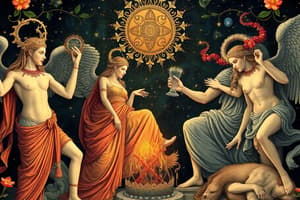Podcast
Questions and Answers
Who is the king of the gods in Greek mythology?
Who is the king of the gods in Greek mythology?
- Apollo
- Hades
- Zeus (correct)
- Ares
What does the goddess Athena represent?
What does the goddess Athena represent?
- Wisdom and warfare (correct)
- Hunting and childbirth
- Sea and earthquakes
- Love and beauty
Which myth features a ten-year conflict between Troy and Greek forces?
Which myth features a ten-year conflict between Troy and Greek forces?
- The Odyssey
- The Creation Myths
- The Trojan War (correct)
- The Argonauts
Which of the following is a theme commonly explored in Greek mythology?
Which of the following is a theme commonly explored in Greek mythology?
What role do titans play in Greek mythology?
What role do titans play in Greek mythology?
Which goddess is associated with love and desire?
Which goddess is associated with love and desire?
What is the significance of the phrase 'Achilles' heel' in modern language?
What is the significance of the phrase 'Achilles' heel' in modern language?
Which of the following is a mythical creature in Greek mythology?
Which of the following is a mythical creature in Greek mythology?
What does the myth of Odysseus primarily cover?
What does the myth of Odysseus primarily cover?
Which of the following best describes the legacy of Greek mythology in modern culture?
Which of the following best describes the legacy of Greek mythology in modern culture?
Flashcards are hidden until you start studying
Study Notes
Overview
- Greek mythology consists of a collection of myths and teachings that belong to the ancient Greeks.
- These myths provide insights into their religion, culture, and values.
Major Deities
- Zeus: King of the gods, god of the sky, lightning, and thunder.
- Hera: Queen of the gods, goddess of marriage and family.
- Poseidon: God of the sea, earthquakes, and horses.
- Athena: Goddess of wisdom, warfare, and crafts; born from Zeus's head.
- Apollo: God of the sun, music, arts, and prophecy.
- Artemis: Goddess of the hunt, wilderness, and childbirth; twin sister of Apollo.
- Ares: God of war and violence.
- Aphrodite: Goddess of love, beauty, and desire.
- Hades: God of the underworld; ruler of the dead.
Key Concepts
- Mythical Creatures: Includes beings like centaurs, minotaurs, and griffins which often symbolize different aspects of human nature or society.
- Titans: Predecessors of the Olympian gods, known for their great size and strength.
- Heroes: Mortals who performed extraordinary feats, including Hercules, Perseus, and Theseus.
Important Myths
- Creation Myths: Explain the origins of the universe and gods, often featuring chaos and the emergence of order.
- The Trojan War: A ten-year conflict between the city of Troy and Greek forces, sparked by Paris’s abduction of Helen.
- Odyssey: The journey of Odysseus as he tries to return home after the Trojan War, featuring trials and adventures.
Themes
- Fate vs. Free Will: Many stories explore the tension between predetermined fate and the choices characters make.
- Piety and Hubris: The importance of respecting the gods; hubris often leads to downfall.
- Transformation: Stories of metamorphoses, such as Daphne turning into a laurel tree.
Cultural Influence
- Greek mythology has significantly influenced Western literature, arts, and psychology.
- Concepts like "Achilles' heel" and "Pandora's box" originated from these myths and are widely used in modern contexts.
Legacy
- Greek mythology remains a vital part of contemporary culture, inspiring literature, films, and modern storytelling.
- It continues to be studied for its rich symbolism and philosophical themes.
Greek Mythology Overview
- Greek mythology is a collection of ancient Greek stories that convey their religious beliefs, cultural practices and values.
Major Greek Deities
- Zeus: King of the gods, wields power over the sky, lightning, and thunder.
- Hera: Queen of the gods, governs marriage and family.
- Poseidon: God of the sea, earthquakes, and horses.
- Athena: Goddess of wisdom, warfare, and crafts, born from Zeus's head.
- Apollo: God of the sun, music, arts, and prophecy.
- Artemis: Goddess of the hunt, wilderness, and childbirth, twin sister of Apollo.
- Ares: God of war and violence.
- Aphrodite: Goddess of love, beauty, and desire.
- Hades: God of the underworld and ruler of the dead.
Key Concepts
- Mythical Creatures: These beings, like centaurs, minotaurs, and griffins, symbolize different aspects of human nature or society.
- Titans: Powerful predecessors of the Olympian gods, known for their immense size and strength.
- Heroes: Humans who perform extraordinary feats, like Hercules, Perseus, and Theseus.
Important Myths
- Creation Myths: These stories explain the origins of the universe and the gods, often involving chaos and the emergence of order.
- The Trojan War: A ten-year conflict between the city of Troy and the Greeks sparked by Paris's abduction of Helen.
- Odyssey: Odysseus's journey home after the Trojan War, filled with trials and adventures.
Themes
- Fate vs. Free Will: Many stories explore the conflict between predetermined fate and the choices characters make.
- Piety and Hubris: The importance of respecting the gods; hubris often leads to downfall.
- Transformation: Stories of metamorphoses, such as Daphne's transformation into a laurel tree.
Cultural Influence
- Greek mythology significantly influenced Western literature, art, and psychology.
- Modern phrases like "Achilles' heel" and "Pandora's box" originated from these myths and are widely used in modern contexts.
Legacy
- Greek mythology continues to inspire modern culture, from literature and films to contemporary storytelling.
- It remains relevant for its rich symbolism and philosophical themes.
Studying That Suits You
Use AI to generate personalized quizzes and flashcards to suit your learning preferences.




